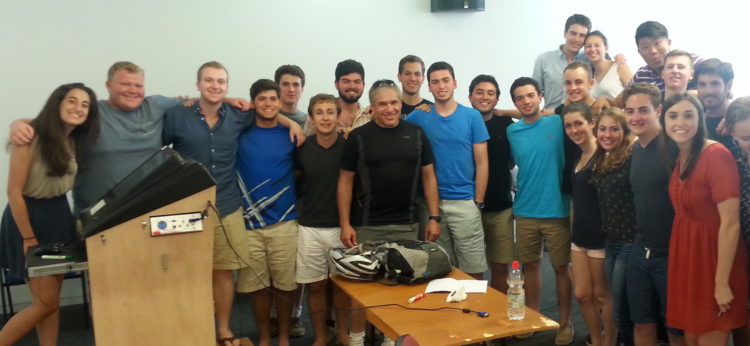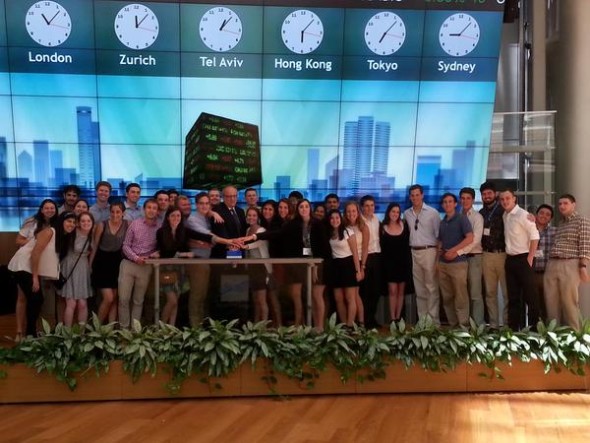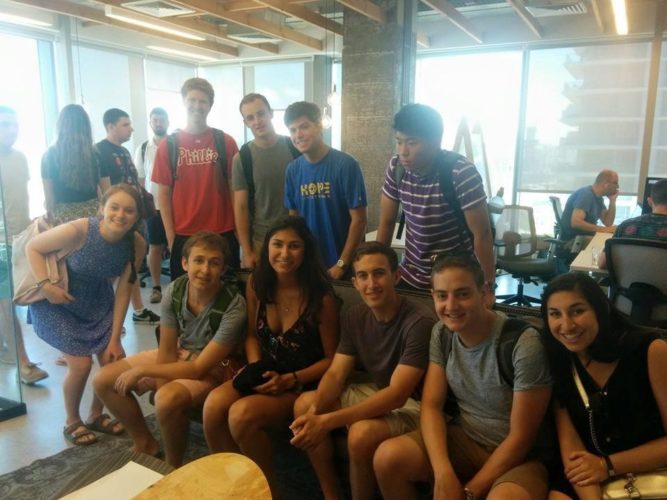In the past week, we have been lucky enough to visit a number of very well known companies. Two of my favorite visits have been to AT&T and to Microsoft. While I expected to have very formal lectures at both places, I was pleasantly surprised by the laid back nature of the discussions. We were graciously welcomed into both establishments. The presenters were wearing jeans and seemed very excited to talk to us. I did not find out until later that one of the speakers at Microsoft was actually a very senior executive who is responsible for running a large part of the Israeli firm. This is more evidence of the casual, and humble nature of many people in Israel.
Guest Blogger: Jessie is a junior at Washington University in St. Louis
Aside from the welcoming atmosphere, I was impressed by the topic of discussion. At both places, we talked about the role these companies are playing in fueling Israel’s startup culture. Both AT&T and Microsoft have programs that encourage young entrepreneurs who have valuable ideas.
More specifically, the AT&T center has its International Innovation Center in Ra’anana, and Microsoft funds a start up program called Microsoft Ventures. The innovation center is a place where a number of innovators collaborate, share ideas, and think of ways to better the experience for an AT&T customer. It is interesting to note, however, that AT&T has no ownership over these companies and they can scale, grow and shift market in whichever way they please.
 I found the Microsoft Ventures program particularly interesting because it is a program that pairs a startup with a mentor company in order to help the business grow. This semester, I did a presentation on Arch Grants, and had the pleasure of learning about their entrepreneurial competition. Just as Microsoft Ventures aims to foster the entrepreneurial spirit of Israel, Arch Grants aims to do the same for St. Louis. Just as Arch Grants funds a number of companies located in T-Rex, a center for entrepreneurs to collaborate, both Israeli accelerators give different entrepreneurs a physical space to exchange ideas.
I found the Microsoft Ventures program particularly interesting because it is a program that pairs a startup with a mentor company in order to help the business grow. This semester, I did a presentation on Arch Grants, and had the pleasure of learning about their entrepreneurial competition. Just as Microsoft Ventures aims to foster the entrepreneurial spirit of Israel, Arch Grants aims to do the same for St. Louis. Just as Arch Grants funds a number of companies located in T-Rex, a center for entrepreneurs to collaborate, both Israeli accelerators give different entrepreneurs a physical space to exchange ideas.
I saw many other parallels in the programs, but he most astounding one was that neither Microsoft nor Arch Grants took any equity in the companies they helped. Although Arch Grants does not currently pair a start up with a mentor company, my team suggested they should. As proven by Microsoft, having a mentor company can give the startup a number of extremely useful resources. They are also both competitions, funding only the winners of extensive rounds of selection. Picking the finest companies and assisting them does great service to both the startup culture and the innovative spirit of both regions.







 Similarly, Rami, from Pitango, charismatically discussed his take on the industry, his personal experience and methods. Rami put the rather large terms we discussed in class into applicable advice that sparked my inspiration. One survival skill that specially stood out was the need to find your weapon. In other words, one needs to find what drives them in order to be successful. Over the next six weeks I am excited to explore this question further and hopefully will leave here knowing what my weapon is.
Similarly, Rami, from Pitango, charismatically discussed his take on the industry, his personal experience and methods. Rami put the rather large terms we discussed in class into applicable advice that sparked my inspiration. One survival skill that specially stood out was the need to find your weapon. In other words, one needs to find what drives them in order to be successful. Over the next six weeks I am excited to explore this question further and hopefully will leave here knowing what my weapon is.


